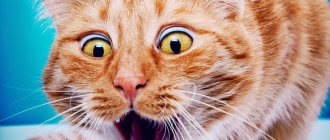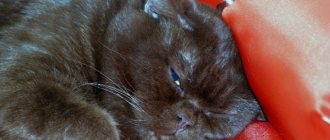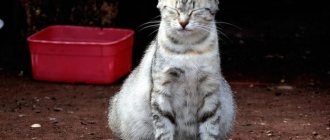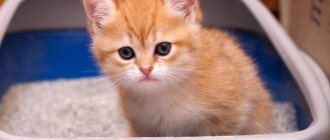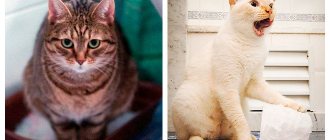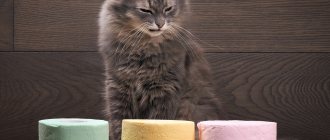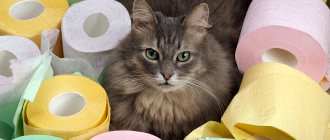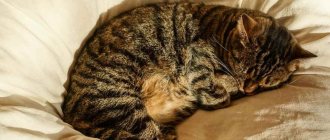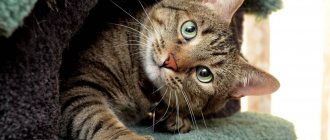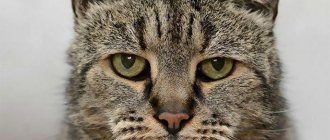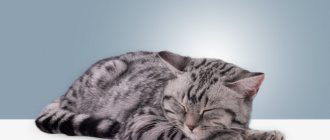Kitten diarrhea (diarrhea) is a fairly common unpleasant phenomenon that owners of cute furry creatures may encounter. Acute indigestion is not always caused by banal poisoning.
If a kitten diarrhea frequently and severely, this may signal various systemic-functional failures and disorders in the body of a small pet. In addition , diarrhea is not an independent disease, but one of the symptoms of bacterial, viral infections, and invasive diseases. If your pet is diarrhea, do not ignore the problem. Analyze what caused the diarrhea. Without knowing the exact root cause of an intestinal disorder, it is impossible to help the animal, much less provide adequate assistance. What to do and how to stop diarrhea in a kitten? How to treat your pet at home?
How to treat diarrhea in a kitten (2 months)? Causes, home treatment, medications, diet
Any animal brought into the house is a full-fledged member of the family. For example, a kitten. He requires the same careful care as a small child. And just as you want your baby to always be healthy, you wish your beloved pet to feel good too.
No one is immune from diarrhea. And diarrhea in a kitten (2 months) can also happen. So what should we do then? It is better to contact a veterinarian immediately. But if this is not possible, you can try to provide first aid yourself.
Signs of diarrhea
In a one-month-old kitten, diarrhea can be confused with a normal bowel movement. All due to too small body size and a dairy diet. Babies up to 3 weeks feed exclusively on mother’s milk (without complementary foods), which is why their feces are mushy, light brown, and “by and large” they walk often - up to 3-4 times a day.
After three weeks of age, when kittens begin to eat adult food, their feces become brown and sausage-shaped; they go to the toilet no more than 1-2 times a day. From this moment on, mushy feces or frequent bowel movements (more than 3 times a day) become not the norm, but a pathology that must be stopped.
In addition to liquid stool and frequent urges, you should pay attention to the following symptoms:
- Anxiety before bowel movement. The kitten is nervous and constantly runs into the litter box.
- Strong smell of feces.
- Pathological color (red, black, green, yellow, white).
- A very alarming symptom is foam or mucus . If there is a large amount of mucus, the stool may become grayish in color.
- An even more dangerous sign is the presence of blood in the stool. Due to the small size of the body, even minor bleeding can lead to severe blood loss. This is a sure sign of worms or an intestinal infection.
If you notice any of these items, especially discoloration or the presence of blood or mucus in the stool, then this is a reason to contact your veterinarian. A change in the color of the stool, as well as inclusions of blood, mucus, and air bubbles are signs of an infectious or invasive disease that can only be diagnosed by a specialist.
Causes
There are several reasons for the occurrence of this disease in a small pet:
- One of them is worms. He can become infected with them from his mother’s milk or her fur, as well as from his four-legged relatives while walking on the street. The most unpleasant thing in such a situation is when the kitten goes to the toilet not only in the litter box, but also somewhere else. You need to know what to feed a kitten (2 months), and how to do it correctly. After all, if you suddenly change his diet, or when he often overeats, the process of digesting food may be disrupted, and this will cause diarrhea. When changing the food familiar to a small pet, you should do this gradually, introducing new foods little by little. You also need to make sure that he eats in small portions to avoid overeating. A kitten may experience vomiting and diarrhea as a result of some infectious disease, for example, chlamydia, panleukopenia, viral peritonitis and many others. A small animal can become infected with such a disease at any time, even though it has received all the necessary vaccinations. A small pet may experience pain, diarrhea, and vomiting if it has swallowed some toxic or hazardous substance. In this case, without immediately contacting a veterinarian, you may lose the kitten. Diarrhea along with vomiting can occur as a result of inflammatory diseases of the stomach and intestines - gastritis, colitis.
- Often, diarrhea in a kitten (2 months) occurs due to very early weaning from its mother, as this can lead to problems with immunity and digestion.
Causes of loose stools in cats
Loose stool in cats can be either a natural cleansing of the body or a serious signal, a manifestation of any ailments, diseases or pathologies. This condition is characterized by frequent bowel movements (more than three to four times a day).
The main causes of loose stools in cats:
- violation of the regime, daily routine, feeding system;
- unbalanced diet, errors in feeding with natural nutrition;
- overfeeding;
- low-quality stale, moldy food, low-grade ready-made feed;
- helminthic infestation;
- bacterial, parasitic, viral infections;
- chronic pathologies of the digestive tract;
- violation of metabolic processes;
- inflammatory processes in the body, fever;
- acute poisoning with food, chemicals, poisons, toxic substances;
- benign and malignant neoplasms in the gastrointestinal tract, neoplasia;
- foreign bodies in the gastrointestinal tract;
- allergic reactions to feed, products, medications.
In adult cats, diarrhea is caused by whole fat milk. Starting from five months, the production of the enzyme that breaks down lactose in the gastrointestinal tract of cats decreases, and the number of enzymes responsible for the digestion of starch increases.
In cats with a sensitive digestive system, intestinal upset develops against the background of food (nutritional) allergies or with a sudden change in diet. Components of ready-made industrial feeds, medicines, and natural products will be identified as allergens.
Important! Most often, diarrhea is observed in small kittens up to 3-5 months of age, street, weakened animals, as well as in long-haired breeds due to hair getting into the gastrointestinal tract.
Any helminthic infestation, regardless of what parasitic worms the pet is infected with, is accompanied by severe intestinal upset, profuse diarrhea, followed by constipation.
Diarrhea in cats occurs against the background of colitis, dysbacteriosis, hyperthyroidism, endocrine pathologies, acute and chronic diseases of the urinary and digestive systems.
Loose stools in a cat can be caused by severe nervous shock, frequent stressful situations, and other unfavorable factors. For example, cats do not tolerate sudden changes in their usual environment or transportation.
Stool color
With diarrhea, the severity of your pet's illness can be determined by the color of the feces:
- If it is black or even bloody, then this is a signal that a disease such as panleukopenia or enteritis is present. There is also a high chance of internal bleeding. These are extremely serious diseases; without the help of a veterinarian, the animal will probably die. Yellow diarrhea occurs due to dysbiosis when helminthic infestations or inflammation of the stomach occur.
- What does it mean if a kitten has green diarrhea? 2 months is still a very young age, but even during this period the baby may experience diarrhea. Green diarrhea and fever are signs of the development of putrefactive microflora. The pet urgently needs to be taken to the clinic so that the necessary antibiotic can be prescribed.
Diarrhea clinic, symptoms
Diarrhea in animals can be acute or chronic. Prolonged chronic diarrhea torments the pet for more than three to five days. In severe cases, a cat can diarrhea for up to 10-14 days, which is very dangerous for the body of small kittens. If a fluffy baby diarrhea periodically, but for several days at a time, this is due to constant exposure to adverse factors that cause intestinal upset in the baby.
In addition to diarrhea, cat owners should be alert to the following symptoms:
- profuse discharge from the nose and eyes;
- loss of appetite, complete refusal of food and water;
- depressed state, lethargy, constant drowsiness;
- rapid weight loss, exhaustion;
- enlarged tummy;
- dull, brittle fur;
- nausea, vomiting, flatulence;
- difficulty breathing, shortness of breath;
- heart rhythm disturbance;
- attacks of dry, wet cough;
- allergic rash, itching;
- restless behavior, plaintive meowing;
- difficulty urinating, defecating;
- increase, decrease in temperature;
- inadequate response to stimuli.
Sick kittens become inactive, do not show interest in the world around them, and look weakened. In any case, if you notice at least one of the above symptoms in your pet, we recommend that you consult a veterinarian.
Diet
First you need to think about what you can feed a kitten (2 months old) and what you can’t, especially during such an illness.
He should not be given anything to eat for 12 hours.
Just a little water. It must be given frequently to prevent dehydration. This treatment method is called a starvation diet.
After this time, you can give a little boiled rice or three-day kefir. The next day you can also give some boiled chicken meat. And so you need to gradually introduce new foods until the pet returns to its usual diet.
What to feed a kitten with diarrhea
After the first symptoms of intestinal dysfunction, feeding stops for 12 hours. The pet should have free access to water - if he cannot drink it on his own, then the owner should regularly help him with a bottle or pipette. Dehydration is a serious problem with the disease, which, if ignored, can end disastrously for the baby.
Ban on raw meat
It is forbidden to use any dairy products - most bacteria thrive in a nutrient medium of coagulated protein. The same conditions apply to foods with large amounts of carbohydrates and starch, and raw meat. The affected gastrointestinal tract is unable to digest them.
Feeding after a fasting diet begins after 12 hours. You should not feed more than a quarter of the usual volume at one time. The basis of nutrition is:
- poultry white meat, chopped using a blender;
- broth made from lean meats;
- boiled rice cooked in water or broth.
Veterinarians advise not to indulge in culinary delights, but to use special products for cats with gastrointestinal problems. Wet food and pates are ideal, and if using pellets, ensure that you have enough to drink. If the cat has previously eaten products from another manufacturer, then the transition to the standard menu is carried out by gradually replacing one type with a second.
Medicinal feeds are prescribed for any pathologies of the gastrointestinal tract. They provide all the nutrients necessary for a full life and have a beneficial effect on the body in case of pathologies. If medications for diseases cannot be used without the recommendation of a veterinarian, then specialized nutrition will not cause harm. Common lines of food for animals with gastrointestinal dysfunction are manufactured by Royal Canin, Health, and Purina.
Consult a doctor!
When a kitten has diarrhea, treatment at home can be done using any method described above. But then it is still advisable to show him to the veterinarian. Perhaps he will additionally prescribe anti-worm therapy or medications for the little patient so that his microflora returns to normal faster.
Since diarrhea is closely associated with the loss of a huge amount of minerals and fluid, the disease of a small pet should never be left to chance.
If a kitten has diarrhea, treatment at home is possible only when it only has this symptom, and the animal is generally as healthy and active as before.
Is diarrhea in a cat a dangerous symptom or a mild disorder?
Mar 2,727
Diarrhea, more often called diarrhea, worries not only people, but also their pets. People often neglect medical help, hoping that the problem will resolve itself. And this applies not only to pets, but also to the owners themselves, who avoid the clinic in every possible way.
Unfortunately, diarrhea in a cat often hides more serious diseases, so its treatment should not be put on hold.
Let's look at the main causes of diarrhea and existing methods of treating it.
Causes
The causes of diarrhea often depend on the negligence of owners who neglect preventive measures. The occurrence of diarrhea is explained by:
- A sudden change in food or usual feeding. Cats have a hard time switching to another brand. Small kittens left without mother's milk and forced to replace it with cow's or goat's milk often suffer from gastrointestinal disorders.
- By eating waste. Due to their individual characteristics, some cats are not averse to stealing leftover food from the garbage can. Not all spoiled foods have an unpleasant odor or taste, but they still pose a danger.
- Intolerance to medications. Diarrhea in cats is a classic side effect of medication.
- An infection of a bacterial or viral nature. Refusal to vaccinate increases your pet's risk of infection.
- Disorders of the metabolic process, intestinal and oncological diseases of the gastrointestinal tract. These include problems digesting food, inflammation, and damage inside the intestines.
- The presence of foreign objects inside the body. Crumpled wool, buttons, toys and much more interfere with the free movement of feces, causing stool upset.
- Allergic reactions. Most adult cats are lactose intolerant, so it is best not to offer them milk. Some animals, like people, may have intolerance to certain types of meat, fish, gluten or brand of food.
- Excessive consumption of food. Overeating not only leads to obesity, which is complicated by a number of more serious and dangerous diseases, but also interferes with the absorption of fluids.
- Infection with helminths. Adults can be found in cat feces.
- Poisoning. The danger of poisoning lurks not only for those who walk on the street, but also for homebodies. Household chemicals, cosmetics and other hazardous substances are found in any apartment.
- Stressful situations. Any events that disturb the pet can disrupt the functioning of the gastrointestinal tract.
- Postponed surgery. Sterilization, which involves anesthesia, slows down internal processes and leads to diarrhea or constipation.
- Other diseases of internal organs: kidneys;
- pancreas;
- liver;
- thyroid gland (diabetes mellitus).
Main causes of diarrhea
Symptoms
Diarrhea severely dehydrates the body, so it poses a serious danger to small kittens. With prolonged diarrhea, adult cats can also suffer, since problems with water balance lead to disruption of the functionality of all internal organs.
Every owner can notice signs of diarrhea in a cat. They are expressed in:
- frequent bowel movements of liquid consistency;
- presence of mucus or blood in feces;
- the appearance of flatulence. Loose stools
In addition to problems with stool, the animal:
- refuses food and loses weight;
- experiences lethargy and apathy;
- suffers from vomiting;
- is in a feverish state.
Pay attention to the duration of diarrhea. If the situation is isolated and a banal return to the previous food helped (intolerance to the new brand), then there is no reason to worry. But in case of bowel dysfunction for more than a couple of days, you cannot do without medical help. Prolonged dehydration aggravates the current situation and is dangerous for cats weakened by another chronic disease.
The nature of the stool and the presence of secondary symptoms play an important role in determining the source of the problem:
- The orange tint is formed due to excessive amounts of bilirubin, which is responsible for liver problems.
- The presence of mucus or foam indicates helminthic infestation or inflammatory processes.
- Green stool signals putrefactive processes inside the intestines, poisoning the body with toxins.
- Vomiting may be due to food poisoning. If after 6 hours nausea is still observed, then the animal needs urgent examination.
- Yellow feces indicate problems with digestion.
- White stool indicates a problem with the excretion of bile, which gives a characteristic color.
- Bloody diarrhea is the most dangerous symptom that requires immediate assistance from a specialist. Blood impurities are explained by internal bleeding.
If the administration of the vaccine leads to diarrhea, the cat should be shown to a specialist again. A vaccination given for a disease with a latent course can aggravate its symptoms.
Signs of the disease
It is worth noting that frequent diarrhea in a cat, observed more than 5 times a day, is considered intense and requires timely treatment.
Diagnosis and treatment
To determine the cause of diarrhea, the following is carried out:
- clinical examination;
- blood test for biochemistry;
- determination of the degree of dehydration;
- general urine analysis;
- stool analysis for the presence of parasites and occult blood;
- endoscopy and colonoscopy;
- X-ray and ultrasound. Normal blood test results
The use of all methods is not necessary if the cause can be determined in the early stages.
Depending on the diagnosis, the veterinarian prescribes treatment, including:
- antibiotics used for viruses and bacteria;
- hemostatic drugs;
- antispasmodics prescribed to suppress muscle spasms;
- anthelmintic or flea medications;
- immunostimulants;
- saline and glucose solutions administered intravenously to eliminate dehydration;
- sorbents (enterosgel, activated carbon, smecta) that absorb harmful substances;
- vitamin and mineral supplements.
If, in addition to diarrhea, your cat does not have other symptoms, then you can try to help her yourself:
- Place the animal on a temporary hunger strike. Adult pets fast for a day, kittens - half a day.
- Purchase good quality medicated food designed for cats with gastrointestinal diseases.
- Provide constant access to water. If your pet is not interested in water on its own, then pour it in small portions with a syringe every 2 hours.
- In the morning and evening, grind activated carbon (0.5 pieces per 1 kg of weight), mix with boiled water and pour into the cat’s mouth through a syringe.
- Eliminate allergens and harmful foods from your diet. Remove milk, carbohydrates and starchy foods. Cat food should be at odds with human food.
- Feed your animal small, frequent meals.
Food should consist of liquid porridges (oatmeal, rice) and light broths. Activated carbon
Please note that blood found in stool precludes self-help. Bleeding should only be treated under specialist supervision. In addition, immediate assistance is required for:
- the appearance of a foul odor;
- the animal's refusal to drink water;
- frequent bowel movements;
- diarrhea in a pregnant or lactating cat.
Conclusion
Remember that diarrhea is often a symptom of a serious illness. Inappropriate treatment used at home can aggravate the pet’s condition and cause complications.
If there is no effect from changing your diet and new symptoms appear, especially blood impurities, do not hesitate and seek qualified help.
Watch also the video on the topic:
Source: https://KoshkiSobaki.info/poleznye-stati-k/lechenie-k/ponos-u-koshki.html
Rules
How to cure a kitten from diarrhea on your own? There are several rules here. Let's look at them:
It is necessary to exclude unhealthy foods from the animal’s diet, especially if they were introduced into the diet not so long ago. The main cause of the disease is both fermented milk and dairy products, store-bought food, which may not be intended for such small animals. This is also table food that people love to feed their pets. When introducing a new product into a kitten’s diet, it is first best to let him try it a little and see how his body reacts. If everything is fine, then you can continue to feed it. By doing this, first of all, you will protect your pet from overfeeding a new product, and secondly, it will be much easier to find out what food an allergic reaction is possible to. If you have a kitten in the house, you don’t need to leave food in places where he can get it. In case of diarrhea, it is advisable to reduce the amount of food in the kitten’s daily diet, although most often the animal itself refuses to eat. You just need to leave a sufficient amount of water in an accessible place so that it can be used to restore the strength of the sick animal. You also need to do some general cleaning, paying special attention to those secluded places where your little pet likes to play. Periodically disinfect the bowl from which he eats. During cleaning, you need to pay attention to whether the chemicals that are constantly used are harmful to animals. When a kitten has diarrhea, you need to handle it very carefully. Play with him only at his request, but under no circumstances throw him up or frighten him. By the way, such small household members may have diarrhea due to some kind of psychological experiences (stress, fear, etc.).
In the case when all of the above has been done, and the diarrhea not only continues, but an unusual color, smell, foam, mucus appears, then you immediately need to take the kitten to the veterinarian to find out the exact diagnosis and its correct treatment. If you delay this visit, it can affect not only the pet’s health, but also lead to death.
Prevention of diarrhea
To avoid intestinal disorders in your furry pet, just follow a few simple rules. Prevention of diarrhea involves:
- creation of optimal conditions of detention;
- systematic care;
- compliance with hygiene rules;
- proper organization of the power supply system;
- preventive vaccinations, deworming;
- feeding with high-quality feed, fresh products with a natural type of nutrition.
Stick to a routine, a daily routine. Keep bowls clean. Wash them after each feeding without using household chemicals. Change your drinking water twice a day.
Remove houseplants that can cause food poisoning from your home. Do not keep household cleaning products, chemicals, or plant fertilizers within the cat’s access area.
Remember that a high-quality, balanced nutritional diet is the key to health, activity and longevity of our little brothers.
Medicines
If a kitten has diarrhea, what else can be treated? Many people prefer medications from a pharmacy.
If a kitten has diarrhea (2 months), then you can give the drug "Atoxil". What is the dosage? A sachet of this drug must be diluted in 100 milliliters of water. Give one teaspoon every couple of hours.
The drug "Regidron" during diarrhea can help against dehydration. Prepare the solution according to the instructions. Give to a small patient in the same way as Atoxil.
A frequent question arises when a kitten has diarrhea: how to treat it? It is also recommended in such cases to use drugs such as Enterosgel or Smecta. "Bifidumbacterin" gives a good effect. The most convenient way to administer medicine into the mouth is to use a syringe without a needle. These drugs will help rid the body of toxins, causing their rapid elimination.
What to do if a kitten has diarrhea?
Diarrhea or diarrhea is the rapid movement of ingested food through the intestines, resulting in symptoms such as increased frequency of bowel movements, loose stools, or an increased amount of stool.
Why does diarrhea occur and how to cure it? Diarrhea in a kitten can occur for various reasons.
The main thing to understand is that if the condition does not go away after 1-2 days, then you need to seek professional help, otherwise frequent liquid bowel movements can lead to dehydration and increased blood sugar.
Causes of diarrhea in kittens
Diarrhea is a common symptom in kittens and usually resolves quickly without veterinary treatment. Persistent diarrhea may indicate one of several health problems and requires diagnosis and treatment. Prolonged diarrhea in small kittens can lead to malfunctions throughout the body.
Animals with diarrhea also suffer from irritation of the intestines and anus.
There are a really large number of reasons that can cause diarrhea in cats. Starting from poor and low-quality nutrition and food allergies and ending with stress.
Only a veterinarian can determine the cause after diagnosis.
The main risk factors for diarrhea in kittens are:
- Worms. One of the most common causes of diarrhea in cats is damage to the digestive tract by parasitic microorganisms. Most often these are round or tapeworms. There is a bloated abdomen, good appetite and poor growth.
- Giardiasis. These are protozoa that enter the animal's body with contaminated water. The disease causes severe gastrointestinal distress, including persistent diarrhea and vomiting. You will also notice diarrhea with mucus in kittens. Kittens most often come into contact with the feces of an infected cat, so they become infected in this way.
- Feeding. Kittens tend to be especially sensitive to new foods. Especially at three months, when the body is not yet strong. A small organism may react to the introduction of a new product or to a sudden transition from dry food to wet food (or vice versa). In addition, cats should be fed from a clean bowl. Eating food from trash cans often leads to poisoning, the kitten vomits and diarrhea. In this case, green diarrhea appears.
- Food allergies. Another common reason. We usually associate allergies with severe itching. But in fact, most veterinarians say that the main symptom of allergies is yellow diarrhea in a kitten, or rather, irritable bowel syndrome develops.
- Ingestion of foreign bodies. If your kitten swallows a foreign body, the digestive tract reacts with diarrhea in order to quickly cleanse the body. In some cases, the kitten may have bloody diarrhea.
- Pancreatitis (inflammation of the pancreas) and feline hyperthyroidism. Diarrhea is one of the symptoms of these two diseases.
- Stress
. Stress increases intestinal motility. For example, at two months, kittens are given into the wrong hands. This can be a strong shock for the baby. - Viruses. Viral infections in kittens can cause diarrhea. Feline retroviral infection can cause diarrhea that will last several weeks and not respond to any treatment.
Diarrhea in a one-month-old kitten can be due to several reasons. The most common is the transition from mother's milk to adult food. The baby may also have digestive system disorders due to poisoning. Therefore, it is important to introduce only fresh foods and give them in small portions for the first couple of months.
If your veterinarian has ruled out parasites, poisoning, and a viral infection as causes of your pet's diarrhea, then a serious health issue may be the cause. For example, cancer or kidney failure. Diagnosis may require invasive procedures, including organ biopsy.
Treatment of diarrhea
Since there are many reasons that can cause diarrhea, diarrhea in a kitten should be treated after diagnosis. The treatment regimen consists of taking pharmaceutical drugs, as well as proper feeding of the animal. Diarrhea can be cured quickly, the main thing is to react in time to the appearance of such a symptom and contact a veterinarian.
Treatment at home:
- Activated carbon
. If diarrhea has just appeared, first aid may consist of giving the animal coal. Activated carbon will only help in case of poisoning or overeating. The dose will be 0.5 tablets per 1 kg of baby’s weight. The drug must be crushed and diluted with boiled water. Insert into the oral cavity with a syringe without a needle. - Diet
. It is also equally important to feed a kitten with diarrhea correctly. Use fresh food, give more clean water. If you have diarrhea, do not give foods that may cause diarrhea. Usually, after weaning from mother's milk, you should not give fermented milk products, canned food, or cow's milk.
If a kitten has diarrhea, what should you do when home treatment doesn’t help? In this case, there is a direct route to the veterinary pharmacy. There are several medications that can help stop diarrhea.
Treatment with pharmaceutical drugs:
- Enterosgel
. This drug was developed to treat diarrhea in humans. However, today it takes its place of honor in first aid kits and for animals. This is an indispensable medicine for small pets. It is especially effective if the kitten has diarrhea and vomiting. Enterosgel cleanses the body of toxins, helps with poisoning and fights intestinal infections. Use according to doctor's recommendations. - Smecta
. The veterinarian gives Smecta to the kitten for diarrhea based on its weight. The recommended dosage for children varies from 0.5 to 2 ml of solution. To do this, take Smecta in dosage and mix it with boiled water. Next, use a syringe without a needle to select the required amount and inject it into the animal’s mouth. If diarrhea continues the next day, then give a second time. - Loperamide
. It is also a human anti-diarrhea drug. However, it is given to small kittens in extremely rare cases. The product stops the passage of feces, which can lead to intoxication. It is used in cases where the kitten needs to be transported to a veterinary hospital.
Remember that all medications you choose yourself must be used with extreme caution. Improper treatment can lead to chronic diarrhea, inflammation, indigestion and other complications.
Prevention
Prevention measures are simple. The main thing is to adhere to them regularly and your pet will never know what diarrhea is.
Prevention rules:
- cleaning and disinfecting cat litter boxes;
- proper feeding using quality products;
- carrying out routine vaccination;
- protection from stress and hypothermia;
- pet hygiene (get rid of fleas in a timely manner).
In addition, give cats anti-worm medications. This way you can avoid infection by parasitic organisms.
Diarrhea or diarrhea is the rapid movement of ingested food through the intestines, resulting in symptoms such as increased frequency of bowel movements, loose stools, or an increased amount of stool.
Why does diarrhea occur and how to cure it? Diarrhea in a kitten can occur for various reasons.
The main thing to understand is that if the condition does not go away after 1-2 days, then you need to seek professional help, otherwise frequent liquid bowel movements can lead to dehydration and increased blood sugar.
Other medicines
But how to stop diarrhea in a kitten with other pharmaceutical drugs? Many of them are also intended for people, and when treating an animal with them, you should definitely consult a specialist. To stop diarrhea, you can use activated carbon tablets.
If diarrhea is due to infection, then under no circumstances should you use antimicrobials or antibiotics. These medications are prescribed by a doctor.
Whatever independent treatment method is chosen, you should always consult a veterinarian, at least by phone. Since improper treatment will lead to diarrhea becoming chronic, there will be frequent signs of indigestion, various inflammatory processes may occur, and much more that is not particularly pleasant for a small pet.
Symptoms
Many owners often do not pay attention to their pet’s stool, but this is in vain, because sometimes serious disorders can occur, which as a result can lead to serious problems with the animal’s health.
The most important and obvious symptom of diarrhea is frequent loose stools. But besides this, other signs may also be observed:
- frequent attempts to defecate;
- manifestations of flatulence;
- the presence of mucus and blood in the stool.
Secondary symptoms can also often be observed:
Important! If a cat has diarrhea with an uncharacteristic color, for example, black or green with impurities of blood and mucus, then in these situations you need to immediately visit a veterinarian. These signs may indicate the presence of a serious illness, and the slightest delay can lead to unpleasant consequences.
Diarrhea in a kitten (2 months). Rules for treating a purebred pet
Most people prefer to buy expensive purebred kittens. Everyone knows that outbred or crossbred animals are much healthier and more likely to adapt to changes around them.
But with purebreds it is much more difficult, and when such a kitten develops diarrhea, it requires special attention. To cure it, you need to adhere to the following rules:
- First of all, provide him with complete peace, try to isolate him from everyone around him - this applies not only to animals, but also to people. After the first signs of diarrhea, a purebred kitten must be put on a starvation diet for approximately 10 hours, while drinking should not be limited, but only water should be given. When these hours have passed, you can then try to feed him a little and keep him on such a semi-starved diet for about another 12 hours. This food should be light and not overly burden the stomach.
Provoking factors for diarrhea in cats
Loose stools in cats are also caused by other unfavorable factors, which breeders should also pay attention to.
Other triggers for diarrhea:
- change of baby teeth;
- decreased resistance, immune defense;
- deworming;
- preventive vaccinations, revaccinations;
- sudden change in diet;
- period of pregnancy, lactation, sexual hunting.
Diarrhea after antibiotics
Diarrhea in a cat can be caused by taking certain medications. For example, a similar condition is noted after antibiotics. Long-term antibiotic therapy reduces the amount of beneficial intestinal microflora. After antibiotics, dysbiosis and intestinal infections develop. Metabolism, digestion processes, and food absorption are disrupted.
Diarrhea after taking medication may also indicate that the cat has an intolerance to certain components of the medication.
Diarrhea after taking anthelmintic
Helminthic infestations are accompanied by disturbances in digestive processes, metabolism, and unstable stools. In cats, especially in young kittens after anthelmintic treatment, especially if the rules for preventive and therapeutic deworming are not followed, intestinal upset is often noted in the first days.
Diarrhea in a cat is provoked by low-quality, expired anthelmintics, non-compliance with the dosages recommended by the veterinarian or those indicated in the annotation for the drug. Please note that the dosage of anthelmintics is calculated strictly based on the weight of the pet.
In addition to drugs, when parasites die, they release toxins that irritate the intestinal walls. Increased peristalsis accelerates the removal of helminths from the body of animals.
Diarrhea in a cat after sterilization
Loose stool in cats after sterilization is a completely normal reaction of the body. Abdominal surgery is performed under general or combined anesthesia. Anesthetic agents often cause uncharacteristic reactions from the autonomic nervous system, which leads to increased intestinal motility (peristalsis).
Loose stools in pregnant cats
Carrying offspring, pregnancy is not only an important period in the life of an animal, but also severe stress for the body. As a rule, unstable stools are observed in the first half of pregnancy and several days before the expected date of birth.
Most often, in pregnant females, stool liquefaction occurs due to a violation of the organization of feeding, when changing the diet and feed. Diarrhea in pregnant cats is caused by stale food, fatty milk, foreign bodies in the gastrointestinal tract, and intestinal parasites.
Important! Cats that bear offspring often change their taste preferences. Females can even eat inedible objects or foods that they previously showed no interest in. This leads to liquefied stool.
If acute diarrhea in a cat is caused by feeding errors, do not worry. It is enough to adjust the diet and exclude foods or feeds that cause diarrhea. If the female is diarrhea consistently, signs of malaise are noticeable, do not delay a visit to the veterinary clinic!
Cat diarrhea after giving birth
After childbirth, the new mother’s body is weakened. Therefore, in the first two to three days the female may have loose stools, which does not indicate any pathology. Diarrhea, an intestinal upset, is most often caused by eating a large amount of afterbirth.
Severe stomach upset after childbirth is caused by stale feed, food, bacteria, viruses, and foreign bodies. Diarrhea can develop against the background of postpartum complications (mastitis, endometritis, hormonal imbalance).
Diarrhea during heat
Stomach upset during a cat's heat is a fairly common occurrence, caused by relaxation of the smooth muscle structures in the pelvic organs. In addition to loose stools, cats experience frequent urination, behavioral changes, and unstable appetite.
Intestinal distress in females can begin a few days before the onset of the rut, at the beginning of estrus, or immediately after the end of the heat.
Intestinal upset from dry food
High-quality dry food, if the pet is not allergic to its components, does not cause intestinal disorders.
Acute and chronic diarrhea is provoked by low-grade economy feed, stale, expired products, as well as feed contaminated with viruses, fungi, and bacteria.
Diarrhea from dry food in cats often develops during a sudden transition from one type of food to another, as well as when feeding kittens with products for dogs or adult cats.
When changing food
A sharp change in the usual diet, for example, a transition from natural to ready-made food and vice versa, at the initial stage is often accompanied by intestinal upset. Liquid feces or unstable stool in a cat are also noted quite often with a combined (mixed) diet.
When changing food, a similar condition is most often observed in cats with a sensitive gastrointestinal tract.
Nutrition
Food that should be fed to a small pet during illness and for some time after it is:
- boiled natural meat, but only lean, chilled, minced into minced meat; a little porridge, oatmeal or rice, but viscous, cooked with meat or in meat broth; hard-boiled chicken egg yolk.
In the first days after illness, it is undesirable to introduce dairy and fermented milk products, fish, and artificial food into the diet of a purebred kitten.
When such a kitten returns to its usual diet, then when purchasing food for it, you need to make sure that it is marked “for animals with sensitive digestion.”
Treatment
Treatment methods for diarrhea and vomiting in cats are divided into several stages - diet, medications, recovery period. First, nutrition is normalized, and in the first days of the disease, fasting is indicated. The selection of pharmacological agents is carried out by a veterinarian. The choice of drug depends on the symptoms.
Expert opinion
Dubas Andrey Leonidovich
Leading physician therapist at the veterinary clinic of Dr. Bugaev
Main criteria for therapy:
- antibiotics for infectious diseases;
- anthelmintics for parasitic infections;
- vitamin complexes to strengthen the immune system;
- probiotics to restore the natural intestinal microflora after a course of antibiotics;
- antihistamines – allergy medications;
- corticosteroids for anti-inflammatory effect;
- adsorbents – removing toxins from the body.
The dosage of drugs is determined by the doctor depending on the weight of the animal.
Medications
Many medications used for humans are suitable for treating diarrhea and vomiting in cats. Antibiotics of a certain series are prescribed for infections, the dose is determined by the doctor. Antiparasitic drugs are used under the supervision of a physician.
To reduce acidity and inflammation of the mucous membrane, the antacid Phosphalugel is used. The solution is given undiluted through a syringe, pouring directly into the cat’s mouth. Repeat 4 times a day. To improve the effect, the adsorbent Lactofiltrum is added. Half the tablet is crushed and added to the syringe with Phosphalugel.
Pancreatin is an enzyme preparation to improve digestion and absorption of nutrients. It is added in crushed form to water or directly into the animal’s mouth.
In case of stool disorder due to a violation of the intestinal microflora and after treatment with antibiotics, it is recommended to give Hilak forte. The consistency and taste of the drug allows it to be given directly instead of food or added to water. It is allowed to give to kittens with diarrhea and vomiting.
After the cat’s condition improves, you need to gradually switch to normal nutrition. At first, instead of the usual products, give special veterinary food. The composition of this food does not irritate the mucous membrane of the gastrointestinal tract and it contains all the nutrients, adsorbents and vitamins necessary during illness.
Need for surgery
Surgical intervention is mandatory if a cancer or cyst is detected that is the cause of diarrhea and vomiting. Neoplasms compress nearby vessels and negatively affect the functioning of organs and systems. Due to the growth and development of a malignant tumor, the animal’s metabolism changes and intoxication develops. Treatment only involves removal of the formation, depending on its location.
Intestinal obstruction is a blockage of the intestinal lumen by an undigested clot of food, hair, or neoplasm. The condition is characterized by the absence of bowel movements in the animal with accompanying symptoms of nausea and vomiting. It is possible to eliminate the patency and restore normal functioning with surgical intervention.
